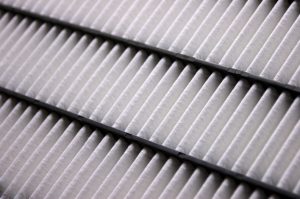 The indoor air quality in your home is probably quite a bit worse than you think it is. Sure, you may not be hacking and coughing every minute you spend inside, but that doesn’t mean that your air quality is as good as it could be. Poor air quality has substantial impact on the health and comfort of the home’s occupants. It can cause all kinds of issues, from allergy attacks, to the flu, to bouts of asthma. These issues are typically the result of exposure to microscopic contaminants. Common household air contaminants include, but are not limited to, dust, pollen, dander, viruses, bacteria, and mold spores. It’s a good idea to install a whole-house air filter to address these contaminants and improve your air quality. Before you do that, though, there are some things that you need to account for.
The indoor air quality in your home is probably quite a bit worse than you think it is. Sure, you may not be hacking and coughing every minute you spend inside, but that doesn’t mean that your air quality is as good as it could be. Poor air quality has substantial impact on the health and comfort of the home’s occupants. It can cause all kinds of issues, from allergy attacks, to the flu, to bouts of asthma. These issues are typically the result of exposure to microscopic contaminants. Common household air contaminants include, but are not limited to, dust, pollen, dander, viruses, bacteria, and mold spores. It’s a good idea to install a whole-house air filter to address these contaminants and improve your air quality. Before you do that, though, there are some things that you need to account for.
MERV
The single most important thing you need to know about a given air filter is its MERV rating. MERV stands for Minimum Efficiency Reporting Value, and determines the effectiveness of the filter. The ratings go from 1-20, with 20 being the highest. Before we get into exactly how MERV ratings work, we’re going to say this up-front: do not just buy the filter with the highest MERV rating! Now that we’ve got that out of the way, let’s look at why you shouldn’t.
The MERV rating is determined by how closely woven the fibers in the filter are. The closer the fibers, the less open space there is for contaminants to slip through and the smaller particles the filter can capture. The filters with very high MERV ratings can even capture individual viral and bacterial cells. That all sounds great, but here’s the issue: the tighter an air filter is, the more effort a system is going to have to put into forcing air through it. Anything above a MERV rating of about 15 is going to require more force than most residential climate control systems can provide. This causes havoc with the operation of the ducts, the climate control systems, and your home comfort.
Before you go installing an air filter, we highly recommend that you settle on one with a MERV rating around 12 or less if possible. That will be enough to remove most common airborne contaminants from your air without causing problems for your climate control systems. What’s the point of higher MERV filters, then? Mostly commercial and industrial applications, such as hospitals and server facilities. These have higher sanitary needs than the average residence, as well as stronger climate control systems to cope with the stronger filter.
If you’re not sure whether or not to install an air filter in your home, contact a professional and have them do a full evaluation for you. They’ll be able to help you find a filter that both meets your needs and works well with your existing HVAC systems.
Touchstone Heating & Air Inc. installs air filters in Gainesville, FL. Contact us today for an appointment with one of our technicians.
